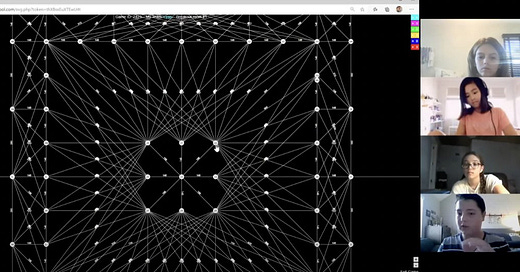Last year, when I wrote this piece arguing that all of the United States’ core institutions are irreparably broken, most readers seemed to agree—with one major caveat: “Fine,” many begrudgingly admitted, “we get that our healthcare system is messed up; journalism seems beyond saving; we’re ready to give up on decayed cultural and communal spaces. But we have kids. We can’t just go ahead and build all new schools, right?”
Wrong.
Synthesis, now a company, started as a class at Ad Astra, the lab school that Joshua Dahn built with Elon Musk on the campus of SpaceX, in Los Angeles. It gave kids the chance to learn concepts and skills by tackling lifelike problems. The thinking tools we learn in school, Musk has noted, make little sense when kids never get the chance to use them. So, Musk hired Dahn to create problem-focused educational experiences.
At first, classes were limited to the Musk children and the kids of SpaceX engineers, but in the fall of 2020, Dahn partnered with Chrisman Frank, the founding engineer at ed-tech giant ClassDojo. The two of them decided to turn their program into its own company, arguing that you didn’t have to be the son or daughter of the world’s richest person to have access to stellar education.
If this strikes you as a bit of Silicon Valley hype, consider the following simple truths. First, every educational system since the dawn of man has been tethered to the socioeconomic system it was created to serve. Back when most of us made a living working the land, we needed the sort of education that taught us the basics of agriculture. Then, with the industrial revolution, we created schools that prepared us for the sort of hierarchical, homogenized environment we were likely to meet in a job in a factory or at a firm. The economy, thankfully, has moved on—we’re in the Information Age now—but education, sadly, has not. So instead of forcing children into standardized settings that suppress the very qualities the new economy values—creativity, problem-solving, team work, audacity—Dahn and Frank bet on something different.
The two saw the COVID-19 pandemic as the opportunity of a lifetime: Perhaps for the first time, parents, watching their children educated over Zoom, realized the poor quality of education their kids were receiving at school. If Dahn and Frank could recreate the Synthesis experience online, they ventured, they had a chance to move the dial on human ingenuity. Parents would sign their kids up for Synthesis to supplement the lackluster results they received from schools over Zoom. The kids would enjoy solving meaningful problems together, maybe for the first time. And society would benefit from having more young people trained to solve hard problems that mirror the real challenges humanity faces in the world.
A year and a half later, Synthesis—for which I’m proud to be an advisor—now has more than 5,500 active students, with thousands and thousands more on a waitlist to join. These kids learn complex problem-solving by competing in teams to win simulations of real-world challenges, like colonizing space, managing wildfires, sustainably fishing the oceans, curating art, running movie studios, and more. In essence, Synthesis lets kids practice the same skills that adults use every day. It throws them into chaotic and competitive situations, challenging them to test their assumptions, make sense of ambiguity, find their voice, and draw out the best in their teammates. It’s much less about coming up with the right answer, that staple of our current educational system, and much more about struggling to understand context and complications and working out some pattern to govern chaos.
Which, if we’re being honest, is as different from modern education as one could imagine. In a typical school, administrators will give lip service to ideas like individual student voice, flexible thinking, and creativity, but the system of education they perpetuate is dedicated to the exact opposite. All you have to do is spend a few moments observing a contemporary classroom to realize the system encourages students to follow strict directions, parrot their teachers’ pet ideologies, and please their fellow classmates enough to gain social status. Kids learn to play a game. They’re taught to try their best to look smart and responsible to adults—and cool and desirable to their peers.
At Synthesis, these values won’t get you far. Kids are faced with real challenges with real stakes. Your team will lose unless it solves hard problems quickly. This reframing of education clears the deck and helps kids cut through the status games that are so distracting in school.
It’s an approach that could easily be applied to any subject, from reading to history and physics to math, and the Synthesis team is looking forward to replacing all of our traditional K-12 education with it. Is this the entirety of a perfect education? No. Faith is a good example of something missing. But this is a foundation on which much else can be built. Exciting? Yes. Ambitious? Absolutely. Unrealistic? Not even a little.
Alana Newhouse is the editor-in-chief of Tablet Magazine.




love it.
How about teaching kids to read? Flood ALL kids with reading, math and study skill requests.